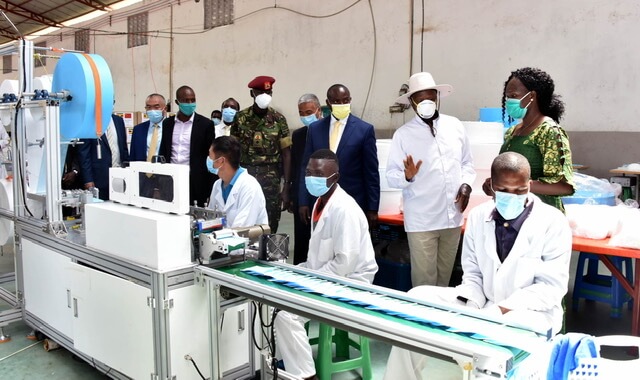
Our Projects are
Transforming African Trade
Quick Contacts
2nd Floor, Fidelity Insurance Centre Waiyaki Way, Westlands

African Union Heads of State and Government have underscored the urgent need for member states to kick-start trading activities, under the African Continental Free Trade Area (AfCFTA).
The decision was adopted during a virtual meeting of the 13th Extra Ordinary Session of the Assembly of the Union on the AfCFTA, this past Saturday, under the Chairmanship of Cyril Ramaphosa, President of South Africa and Chairperson of the African Union (AU).
The summit is taking place just four weeks before the AfCFTA commences trading on January 1, 2021, to consider the adoption of the legal instruments that will facilitate its operation.
“Today we stand on the cusp of a new era in the progress of our continent,” said Ramaphosa, adding, “The moment that we have all been working painstakingly towards has finally arrived…We are all filled with a great sense of pride at how far we have come to reach this moment”.
All 55 member states of the African Union will be brought together by AfCFTA which allows for market covering of over 1.2 billion people not limiting the growing middle class, and a collective gross domestic product of over US$3.4 trillion.
This also makes AfCFTA the world’s biggest free trade area after the establishment of World Trade organisation.
AfCFTA has the ability to enhance intra-African trade by 52.3 percent by removing import duties, and also to double this trade if non-tariff barriers are also reduced.
AfCFTA seeks to create and achieve unilateral continental market for goods and services, with free movement of investments and business personnel.
Uganda’s Trade Minister Amelia Kyambadde recently said the country’s sustainable investment in trade facilitation and the positive strides undertaken by local manufactures in improving the quality of local products has contributed to Uganda’s readiness to conquer bigger markets especially the AfCFTA.
“We have implemented several trade facilitation measures such as Electronic Single Window; Electronic Cargo Tracking; One Stop Border Posts; Non-Tariff Barriers (NTBs) identification and removal mechanism, Yellow Card Scheme and the Border Export Zones, among others…” said Kyambadde.
The AU Chairperson recalled the collective journey embarked upon over four decades ago, with the adoption of the Monrovia Strategy in 1979, followed by the Lagos Plan of Action in 1980, the Abuja Treaty in 1991 and the subsequent Decisions and Declarations adopted during previous Summits relating to the economic development and integration of the African continent.
“And now, we are about to witness the realisation of one of the flagship projects of Agenda 2063,” said Ramaphosa.
“Throughout this process, we have stood united, with 55 sovereign AU Member States rallying together, despite different levels of economic development and diverse strategic priorities. The commencement of trading under the AfCFTA on the 1st of January 2021 is one of the most significant milestones in the continental integration project,” said the President.
He underlined that, this is going to be the clearest affirmation that Africa is determined to take charge of its own destiny, and that its success and development is fundamentally tied to harnessing the potential and energies of her citizens.
According to President Ramaphosa, the AfCFTA will boost intra-African trade, promote industrialization and competitiveness and contribute to job creation, and also unleash regional value chains that will facilitate Africa’s meaningful integration into the global economy.
The AfCFTA is expected to improve the prospects of Africa as an attractive investment destination; advance the empowerment of Africa’s women, by improving women’s access to trade opportunities which will in turn facilitate economic freedom for women, and expand the productive capacity of countries.
“To support this, we must strengthen women’s participation in the continental economy by ensuring there is greater public procurement earmarked for women-owned businesses. We must ensure that there is sufficient support given to women-owned SMMEs and cooperatives in both local and regional economies,” emphasised Ramaphosa.
According to Secretary General of AfCFTA, Wamkele Mene stressed that integrating 55 markets will not be easy but giving up is not an option.
“Today, 54 countries have signed the agreement while 34 countries have deposited their instruments of ratification, and 41 countries/customs unions have submitted their tariff offers, including the EAC and ECOWAS,” said Wamkele.
The Assembly deliberated that the exchange of tariff concessions between State Parties will be conditioned by the principle of reciprocity in terms of product line coverage, and tariff reduction schedules that are aligned with the agreed modalities
AfCFTA is expected to boost Africa’s income by $450 billion by 2035 (a gain of 7 percent) while adding $76 billion to the income of the rest of the world.
The free trade area initiative will also see an increase in Africa’s exports by $560 billion, mostly in manufacturing and spur larger wage gains for women (10.5 percent) than for men (9.9 percent).
Currently intra-African trade is a mere 15%, compared to around 47% in America, 61% in Asia and 67% in Europe, according to UNCTAD data for 2015 to 2017, but the AfCFTA could radically change that.
Read original article
Disclaimer: The views and opinions expressed in this article are those of the authors and do not necessarily reflect the official policy or position of TradeMark Africa.